Sad but true: It’s easy to become blasé about the bounty of live music happening pretty much on any given night around Western North Carolina (and on any given street corner, for that matter). In fact, with singer/songwriters playing corners of crowded restaurants (like Americana with your pad thai?), indie groups banding together for fundraisers, pop vocalists jumping onstage to chime in with soul keyboardists and gospel duos hammering out tunes on Pack Square, it’s hard to avoid live music.
You might actually find yourself grumbling that you don’t want to hear another band; you just want to stay home with a bag of microwave popcorn and a rerun of House. But stray out of the immediate area and suddenly the musical offerings become slim pickings, and you’ll start craving Asheville’s vital (if occasionally overwhelming) music scene.
The solution? Stock up on your favorite local artists’ recordings. From funk to folk and bluegrass to Britpop, there’s something to fill every niche. Wondering where to begin? Xpress turns a critical eye on 15 of 2007’s local releases:
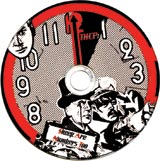
Sheep Are Numbers Too by The Human Condition
Even if slightly jazzy, slightly proggy, slightly gothy rock isn’t your thing, chances are that you’d still probably find yourself at least mildly enjoying something on this album if you gave it a listen, largely due to the band’s underlying pop sensibilities. Recorded live at BoBo Gallery earlier this year, Sheep lacks the subtle tweaks of a studio album, but still presents a strong document of the band’s potential. The high points are the shorter songs—such as “Let’s Build a Triangle”—which hint at an a radio play-friendly potential to Human Condition’s music, rather than the prog-rock jam that drag down some of the album’s lesser tracks.
– Steve Shanafelt
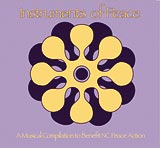
Instruments of Peace by various artists
The sale of this mostly local compilation benefits the North Carolina-based affiliate of grassroots network Peace Action (www.ncpeaceaction.org). But there’s really nothing about the collection of songs (from Tyler Ramsey’s delicate finger picking on “Along in the Sun” to the fully leaded groove of Green Light’s “Keep the Faith”) that seems particularly peaced out. Instead, the sophisticated mix is heavy on jazz riffs, muted horns and cymbals played with brushes, and seems to demand that the listener shake a martini or tilt a fedora. Certain tracks tend to linger too long (Jeff Sipe’s “Osiris,” at nearly 11 minutes, is one) but gems like Chuck Lichtenberger’s tastefully cool “4 Dollars and 4 Cents” will win this disc high rotation on the CD changer.
– Alli Marshall
The Sunlight and the Sound by Nevada
Asheville’s retro indie-pop six-piece Nevada has merged the feel-good harmonies of ‘60s California folk rock with the ethereal, synth-driven noise rock of the ‘80s, and emerged with a debut worthy of comparisons to artists as diverse and influential as My Bloody Valentine and Fleetwood Mac. Spacey male/female vocal melodies soar alongside bright keys throughout The Sunlight and the Sound, complementing the reverb-soaked guitar leads of daydreamy anthems like “Flier’s Dream” and “In the Light”—an album highlight reminiscent of early R.E.M—while shifting to a delicate, near whisper for the album’s alt-country slow burners like “Fading.” And though Nevada’s sound is undeniably “classic,” they have just as much in common with Midwestern indie-rock artists Rilo Kiley and ‘80s Brit shoegazers Modern English as they do with Crosby, Stills & Nash. Nevada carries these influences well throughout the album, managing to meld seemingly contradictory elements of new wave, folk, classic rock and contemporary indie into a seamless offering that pays homage without coming off as derivative.
– Dane Smith
Love and Monsters by Laura Blackley
“I specialize in love and murder ballads, ghost stories and done-somebody-wrong songs. I love the blues, rock and roll, and country music,” writes Blackley on her MySpace page. “And you can tell it when you listen to my records.” Now on her fourth album, Blackley has decided not to mess with that winning formula. Instead, she’s decided to make this the best damn “love and murder ballads, ghost stories and done-somebody-wrong” album she can make. Keen-edged songs are memorably rendered by Blackley and her superb backing musicians, and there are no faults to be found in the recording. As good as the album is, however, it’s basically covering the same ground as her earlier recordings, and for those familiar with her work there aren’t many stylistic surprises waiting.
– Steve Shanafelt
The South French Broads by The South French Broads
The beginning lyrics on the first track, “Intro/It Ain’t Easy,” of The South French Broads self-titled debut album prepare the listener for their “not so radio-ready” sound, and proclaim that they “just hope to entertain.” While not nearly as politically charged or hard as bands from the mid-1980s California punk scene, the South French Broads are nonetheless reminiscent of, say, Dead Kennedys, and their bass-heavy sound brings the band Flipper to mind. But in the place of reactionary lyrics, Alex and Radix of the Broads offer up zaniness. Though the words may not be so inspired, there’s a lot of love for Asheville on this disc—and Asheville-style mentality (the song “B+” is about taking a positive look on life). Still, the music is at its best when Alex’s bass is the voice. There are 19 tracks (including one hidden song) on the album, but the longest song is barely more than three-and-a-half minutes, which means it never takes long to get to the next one. Among the 19, there are certainly some that entertain.
– Mannie Dalton
Unheard Of by Dave Desmelik
Asheville-based singer Dave Desmelik has a unique voice that manages at once to crackle like a twig underfoot and glow like polished wood. Unheard Of, his fifth full-length offering, finds Desmelik in good form on nearly a dozen original songs. Each is a unique quantity, shaded with melancholy and touched with original humor. The album’s forward thrust seems made for the road. “Always travel with someone you trust,” Desmelik urges in the album’s second track, “It Won’t Be Long.” With his amiable voice and a lyrical wisdom that seems wrung from life’s little moments, Desmelik might just be that someone, wherever your travels happen to take you.
– Kent Priestley
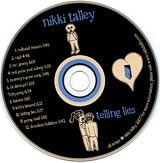
Telling Lies by Nikki Talley
An image of a woman’s face fading into the lights and skyscrapers of a city skyline decorates Nikki Talley’s new album, Telling Lies. When you think about it, this image beautifully reflects the lyrics and mood of Talley’s evocative recording. “Citysong,” “Going Mad” and “Drunken Lullabye” are songs that, like the photo on the cover, offer a theme of finding strength in lonely places, and an ongoing struggle to focus despite emotional confusion. Talley’s voice is quietly commanding, and her songwriting evokes a sense of sorrowful exploration. With the acoustic power of indie artist Mirah and the lyrical authority of Tori Amos, Telling Lies is a singer/songwriter introspective of personal discovery.
– Aiyanna Sezak-Blatt
Orange Thread in a Blue Sea by Angi West
Angi West’s self-produced, self-released debut is an ambitious undertaking for a fledgling artist. Perhaps too ambitious. Though West hits the mark on straightforward folk ballads like “Elijah,” “If You Remember” and the a cappella “Blackest Crow,” her attempts at more lush arrangements on tracks like “A Good Catholic Boy” and “Every Drop In This Glass” are less effective. West’s theatrical soprano is inconsistent on these offerings—especially her overused falsetto—and when it falters, the singer’s sometimes-awkward phrasing and melodies are especially prevalent. At her worst, West is a mediocre knock-off of late-‘90s chart-topping singer/songwriters like Paula Cole or Michelle Branch. However, standout tracks like “The Light In Your Eyes” and the pop-friendly piano ballad “Saying Goodbye” are evidence of West’s potential as a songwriter and lyricist. Despite a smattering of lackluster offerings, Orange Thread is a promising start for an artist who, at her best, manages to evoke nostalgia and longing with mournful strings, lonesome melodies and effective imagery.
– Dane Smith
Could Have Talked All Night by Dave Turner
Coming from the tradition of bar-bound piano players with a tip jar full of stories to tell, Dave Turner knows how to relate a memorable story over a simple yet well-crafted melody. With nice production values and great backing performers (including Stephanie Morgan), Turner’s tunes are given a near-perfect studio treatment. At their best, his songs have the narrative depth of short stories (“Lumberton” and “Billy Ray’s Chevrolet,” in particular), and while some tend towards the melancholy, the songs never overstay their welcome. The album’s only real failing is that Turner sticks to the same stylistic palette of bars, blue-collar lives and tales of being a working musician, which gets old about halfway through the recording.
– Steve Shanafelt
Tell Me by Menage
Featuring a plethora of Asheville heavyweights backing them up on six of the album’s 12 tracks, Menage’s wonderful and affecting Tell Me veers from country and rock to jazz swing. Asheville’s Mary Ellen Bush and Sarah McDonald penned all the tracks save for one, “Too Far to Drive,” which is the album’s standout. This killer country song is redolent of Dixie Chicks, Lucinda Williams, Tift Merritt and a smattering of other young female country singers. And while there is certainly nothing wrong with Menage’s self-penned and musically diverse songs, the cover track is so good one wishes these incredibly talented women would pick a genre (preferably country) and stick with it on their next recording project. The only real stumble on Tell Me is the decision to include three live tracks from a Grey Eagle performance that cause this otherwise well-produced and sonically satisfying album to veer into lo-fi territory. Still this album, overall, is certainly a worthy one to add to your local collection, if for no other reason than to hear these ladies sing—and boy can they sing.
– Hal L. Millard
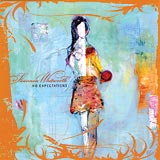
No Expectations by Shannon Whitworth
The front of this debut solo project by former Biscuit Burner Shannon Whitworth is an appealingly abstract milieu of colors and shapes. Even the blurry back image of a girl with a guitar does little to prepare the unsuspecting listener for the barrage of banjo on the opening track. Banjo, like goat cheese, is an acquired taste. Happily, the following tunes like “Teach Me How to Fly,” and “Killin Time” feature the Brevard-based musician’s low, soulful voice and considerable talent on guitar, pedal steel and Dobro. This album, overall, has the radio-ready sound of contemporary country sure to charm a wide audience.
– Alli Marshall
Joltwagon by Joltwagon
It’s not that Joltwagon isn’t trying. Over the course of 14 tracks, the group tries to fuse bluegrass with grunge, ‘70s country rock with honky tonk and—I’m not kidding here—klezmer with bluegrass and swing. Unfortunately, it’s a mess of an album. Some of the issues are forgivable; lackluster production values and a tendency to stretch out songs that really don’t call for it, for instance. But the album’s real problem—and it’s a painful one—is that the group’s understanding of songcraft is weak. They know how to create an interesting premise for a song by mixing and matching elements of other genres, but have no idea how to turn that into a meaningful standalone work. It’s great that Joltwagon is willing to try something new with this debut, but a bit less experimenting and more clear direction would have served this album well.
– Steve Shanafelt
Even In the Midst by Ahleuchatistas
Continuing its tradition of dissonant, chaotic (yet surprisingly precise) instrumental rock, critically acclaimed Asheville trio Ahleuchatistas meanders its way through 45 minutes of mathy rhythm flux and noisy confusion on Even In the Midst, the band’s fourth effort in as many years. Without compromising the frantic pounding and technical splendor of epic tracks like “Cup of Substance” and the album’s opener “… Of All This,” Ahleuchatistas also manages to churn out more accessible melodies against a backdrop of unorthodox time signatures on simmering jams like “Take Me to Your Leader Never Sounded so Alien” and the six-and-a-half minute “Prosthetic God,” whose jazzy mid-song breakdown is an album highlight. From a production standpoint, the record is about as bare bones as they come, abandoning overdubs and effects pedals for raw energy and improvisation. And rightfully so. Even In the Midst‘s brilliance lies in the winding free-form guitar-rock, cacophonous post-hardcore and experimental ambience that overproduction would completely diminish.
– Dane Smith
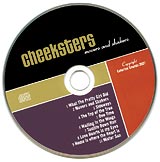
Movers and Shakers by The Cheeksters
The third effort of Britpop duo (or trio, depending) The Cheeksters (whose members met in London, record in Nashville and live in Asheville) is a slick, jangly, near-seamless confection. This album places its strengths up front with little subterfuge. There’s the obvious Beatles influence, the soaring falsetto and a touch of ‘80s-era Duran Duran (especially on “One Time”)—but the disc is also ripe with jazz touches, a modern mixing of atmospheric Wurlitzer and gorgeous cello on “Waiting in the Wings,” and the danceable New Wave throwback feel of “Love Hearts in My Eyes.” Whatever Movers lacks in angsty complexity, it more than makes up for in consistency and a sense of sheer joy.
– Alli Marshall
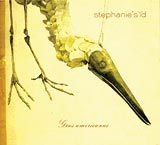
Grus americanus by Stephanie’s Id
This album, which takes its name from the Latin binomial for the whooping crane, is the band’s first full-length project since 2005’s Spiral In. Like its namesake species, the album’s production is a large and lofty thing, with all manner of electronic and organic sounds blooming from the speakers on each track. Stephanie Morgan’s lyrics are spare, haiku-style and appealing. The album’s greatest weakness is also its chief artistic virtue: its restlessness and its unwillingness to be tied to one thematic or stylistic thread. Morgan’s voice shifts chameleon-like between tracks, a fact that ultimately dulls the album’s appeal. Still, Grus takes flight in places, including on the made-for-radio “Hey, Hey, Hey,” a song led off by an electric piano riff that would sound at home in Donald Fagen’s sitting room.
– Kent Priestley
Taking Notes by Garry Segal
Most known for his work as a harmonica player, Gary Segal obviously knows what he does well, so it’s hard to fault him for avoiding the things he doesn’t. Segal’s not a great singer, but he uses what local range he has in a perfectly enjoyable way. He’s not an outstanding songwriter, either, but he writes reasonably good songs that tell their stories in the standard verse-and-chorus format. But, while this may sound like a recipe for a mildly entertaining album, after a few songs the listening experience becomes frustratingly predictable. With a noteworthy set of session players backing him, Taking Notes demonstrates that Segal sounds pretty much the same, whether he’s singing for a bluegrass group or a bluesy jazz band. His songs are never bad—taken individually, some are actually quite good—but they’re never attention capturing, either. One could only wonder what this album could have been if Segal were willing take a few risks and push his creative limits just a little more.
– Steve Shanafelt



The first record on this, list Sheep Are Numbers Too, is by the band ‘The Human Condition Presents:’. The word Presents AND the colon are part of the band name. By the way the band broke up in July. So much for potential.